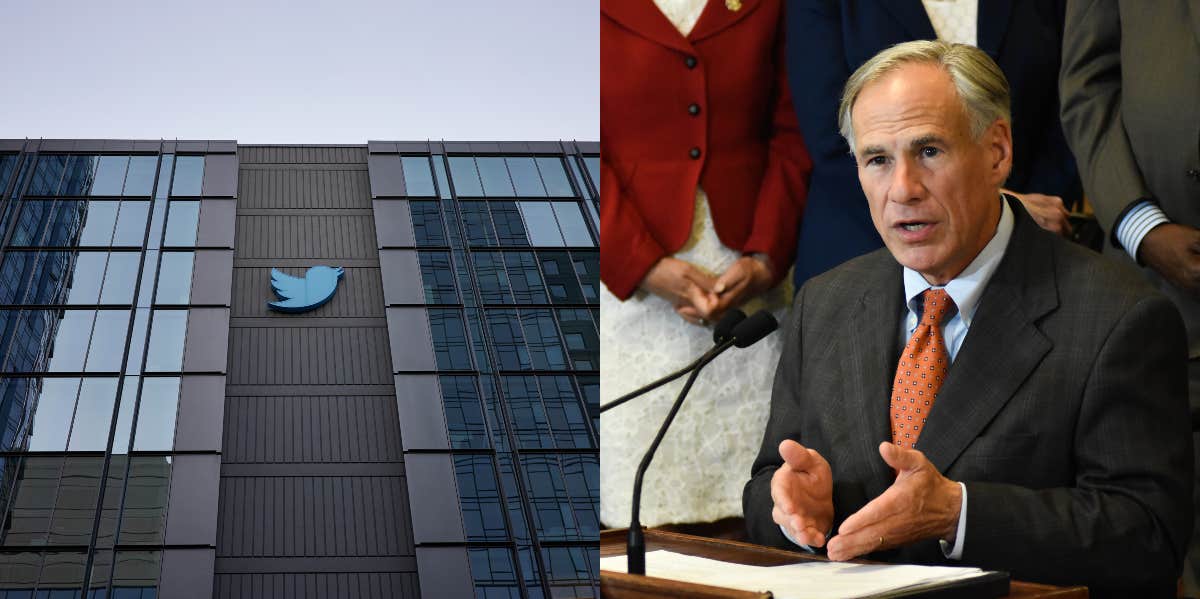Texas Governor Signs Bill To Stop Social Media From Banning Users Based On Their Political ‘Viewpoint’
Like, for example, encouraging the storming of the Capitol.
 Tada Images / Carrington Tatum / Shutterstock.com
Tada Images / Carrington Tatum / Shutterstock.com Texas Governor Greg Abbot signed a bill that will prevent large tech companies from blocking or restricting conservatives based on their political viewpoints.
“It is now law that conservative viewpoints in Texas cannot be banned on social media,” Abbott said, setting the stage for a legal battle that Facebook, YouTube, Google, and Twitter all plan on fighting.
Texas' social media law aims to stop political censorship.
The new law applies to only the largest social media platforms in the country with more than 50 million monthly active users — including YouTube, Facebook, and Twitter — and would require them to issue reports whenever a post violates their policy or could be illegal.
RELATED: Opposing Opinion Won't Disappear Just Because Big Tech Bans It
The governor also wants these sites to set up a complaint system where people could challenge the removal of content based on those grounds and even overturn those decisions.
Accordingly, lawsuits could be filed against the tech companies if individuals believe they were wrongfully terminated from the site.
The law undermines social media company's right to refuse service.
The problem is, these tech companies and social media platforms are private businesses — when you sign up, you are agreeing to the terms of service and privacy policies set by the business itself as a private entity.
If you violate those terms of service, the fault lies entirely on the user and the company is allowed to take whatever action it deems necessary.
The determining of whether or not content could be seen as an issue or in violation of those terms, is entirely up to the company as well.
The argument that the new law makes is that social media platforms function as “common carriers,” and Supreme Court Justice Clarence Thomas claimed that they should be regulated as such.
Similarly to how phone companies face specific regulations because of how essential the services they provide are to the country.
Social media censorship laws pander to conservatives.
Florida tried to pass a similar law in May that targeted political candidates that were banned from social media specifically, and was subsequently blocked by a federal judge.
Eric Goldman, a professor at Santa Clara University School of Law, said the Texas law does not “survive critical scrutiny,” and expects the law to face a similar treatment as the Florida law.
He said that both laws “represent an effort to play for partisan crowd, not to make good policy.”
Abbot claimed that “There is a dangerous movement by some social media companies to silence conservative ideas and values,” without citing evidence.
Social media bans have typically been used to protect public safety, not silence 'conservative ideas.'
Donald Trump faced his social network ban as a result of the January 6th Capitol insurrection which he directly incited through his social media messages and his claims of election fraud after losing the election to President Joe Biden.
Other conservatives have also seen social media bans for spreading misinformation about Covid-19 and the vaccines.
Congresswoman Marjorie Taylor Greene (R-Ga.) has received 3 separate bans from Twitter, most recently being banned for a week for violating their “COVID-19 misleading information policy.”
Once-popular conservative social media app Parler was taken off of Amazon, Google and Apple app stores for being directly linked to the Capitol invasion as well.
Free speech continues to be used to reel in Republican voters.
Adam Kovacevich, the CEO of the Chamber of Progress, which includes Facebook, Google and other tech giants as funders, says that politicians are simply yelling into the First Amendment echo chamber.
“This will certainly be ruled unconstitutional as well, but Republicans won’t pay any price because they view it as good politics,” he said. “It’s going to keep heading into a First Amendment buzz saw.”
The fight for Freedom of Speech allows these Republican governors, who are rumored to be making Presidential runs in 2024, to build momentum in their political gambits.

